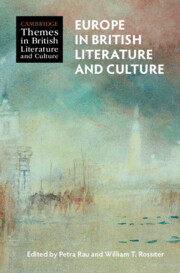Book contents
- Europe in British Literature and Culture
- Cambridge Themes in British Literature and Culture
- Europe in British Literature and Culture
- Copyright page
- Contents
- Illustrations
- Contributors
- General Editor’s Preface
- Acknowledgements
- Introduction
- Part I Zones of Influence
- Part II Pan-European Moods and Movements
- Part III Cultural Transfers
- Part IV Anxious Neighbourhoods, Uncertain Futures
- Chapter 21 Blockade Communications
- Chapter 22 Britain as the ‘Asylum of Nations’
- Chapter 23 Great Games
- Chapter 24 Border Crises
- Index
Chapter 21 - Blockade Communications
British Cultural Diplomacy and the Wartime Border
from Part IV - Anxious Neighbourhoods, Uncertain Futures
Published online by Cambridge University Press: 06 June 2024
- Europe in British Literature and Culture
- Cambridge Themes in British Literature and Culture
- Europe in British Literature and Culture
- Copyright page
- Contents
- Illustrations
- Contributors
- General Editor’s Preface
- Acknowledgements
- Introduction
- Part I Zones of Influence
- Part II Pan-European Moods and Movements
- Part III Cultural Transfers
- Part IV Anxious Neighbourhoods, Uncertain Futures
- Chapter 21 Blockade Communications
- Chapter 22 Britain as the ‘Asylum of Nations’
- Chapter 23 Great Games
- Chapter 24 Border Crises
- Index
Summary
The blockade has been a long-standing economic and military tactic to isolate enemy nations and force them to endure siege conditions. This chapter examines how British or pro-British cultural actors managed to disseminate propagandized cultural texts and information via secret channels of communication, smuggling in the cultural capital of the enemy nation(s). The first example is the Bibliothèque britannique, the Geneva-based journal which commissioned and published many translations of British scientific and literary works during the Revolutionary and Napoleonic Wars; second, the translation activity during 1914–18 with poetry as case study; third, the role played by the pro-European group, the Federal Union and finally the internationalism and human rights discourse of writing advocated by PEN in London during the Second World War. The chapter concludes with a Cold War section examining soft diplomacy in the use of literature and art to disseminate liberal thinking behind the Iron Curtain. How far do these blockade moments articulate federal and internationalist aims and projects while risking isolationist rhetoric in the construction of liberal ideals in wartime?
Keywords
- Type
- Chapter
- Information
- Europe in British Literature and Culture , pp. 339 - 353Publisher: Cambridge University PressPrint publication year: 2024

